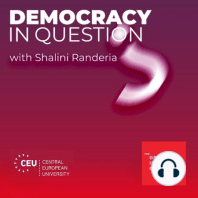25 min listen

Covid-19: How can we democratize vaccine access?
Covid-19: How can we democratize vaccine access?
ratings:
Length:
30 minutes
Released:
Apr 21, 2021
Format:
Podcast episode
Description
Covid-19 vaccines have been developed in record time and are being distributed around the world. But issues like vaccine hesitancy, slow production and unequal access between as well as within countries are inhibiting the global vaccination progress needed to combat the pandemic. In this first episode of season 2, we’re joined by Dr. Suerie Moon (Graduate Institute) to explore how vaccine nationalism and patents pose obstacles to increasing vaccine production. She discusses how Covid 19 has exacerbated existing inequalities and how vaccine access could be democratized. Democracy in Question? is brought to you by:• The Institute for Human Sciences in Vienna: IWM• The Albert Hirschman Centre on Democracy in Geneva: AHCD• The Excellence Chair and Soft Authoritarianism Research Group in Bremen: WOC• The Podcast Company Earshot StrategiesFollow us on social media!• Institute for Human Sciences in Vienna: @IWM_Vienna• Albert Hirschman Centre on Democracy in Geneva: @AHDCentreSubscribe to the show. If you enjoyed what you listened to, you can support us by leaving a review and sharing our podcast in your networks!BIBLIOGRAPHY• Who funded the research behind the Oxford-AstraZeneca COVID-19 vaccine?(2021).• The Vaccine Race: Will Public Health Prevail Over Geopolitics. (2020).GLOSSARYWhat is the “Texas Project” Chicken Egg Vaccine?(00:13:00)This new vaccine, currently undergoing clinical trials in Brazil, Mexico, Thailand and Vietnam, called NDV-HXP-S, is widely expected to create more potent antibodies than the current generation of vaccines and to be far easier to produce. Production would be done, like influenza vaccines, through injecting the virus into chicken eggs to multiply it and extract a “dead” variant to combine in the vaccine concoction. It would make the production much cheaper and simpler, allowing low- and middle-income countries, who struggle to obtain current vaccines from wealthy countries to produce their own supply. The vaccine itself was developed by scientists at the University of Texas and licensed through the Public Health non-profit PATH. Source. Non-Profit PATH. What is the Gamaleya Research Institute and the Sputnik Vaccine Timeline?(00:15:00)The Gamaleya National Center of Epidemiology and Microbiology is a Russian biomedical research institute in Moscow under the Ministry of Health of the Russian Federation, named after Ukrainian, Russian and Soviet scientist Nikolai Fyodorovich Gamaleya. The Gamaleya Institute announced a COVID-19 vaccine candidate for the first time in May 2020, with clinical trials starting the month after. Before Phase 3 trials of the vaccine started, which are the largest trials on thousands of people and final step before openly registering and allowing a vaccine on the market, President Putin officially announced the registration of the world’s first COVID-19 vaccine, Sputnik V. Official Phase 3 trials began in September 2020 and rollout in December 2020. The first official study of Sputnik V in a peer-reviewed medical journal was published only in February 2021 in “The Lancet”. The vaccine has been viewed critically by the international community due to the Russian Federations attempts to use it as a tool for diplomacy and to exert geopolitical influence. Learn more about Sputnik V. “The Lancet” study.What is the TRIPS Agreement?(00:20:30)The TRIPS Agreement is the most comprehensive multilateral agreement on intellectual property overseen by the WTO. It came into effect on 1 January 1995. It covers and protects copyright, trademarks, industrial designs, patents and undisclosed information such as trade secrets. In March 2021 more than 80 developing countries have pushed for a waiver of the TRIPS Agreement to boost production of vaccines in their countries. The push was ultimately blocked in the WTO by wealthy nations, such as EU countries, Britain, Switzerland and the United States, supported by large domestic pharmaceutical industries, keeping vaccine access away from poorer coun
Released:
Apr 21, 2021
Format:
Podcast episode
Titles in the series (77)
When and how is power visible in politics? by Democracy in Question?